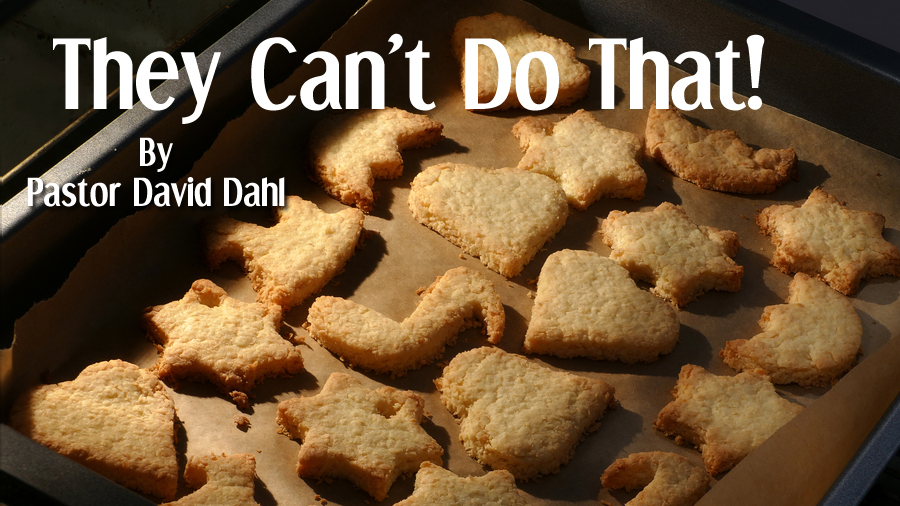They Can’t Do That!

by David Dahl
They can’t do that! That’s the refrain that is loaded and waiting in our minds just in case family gatherings are limited due to COVID-19 – or a mask order is put into place.
The shadow of the pandemic has affected all of us, limiting our closeness to each other and our ability to interact, play games and share meals. These are not small matters. It pushes us to either get ornery or creative.
So I invite you to ponder another situation: What if baking with butter, cream, eggs and sugar was against the law? Take that out of your holiday cooking and you’ll find that wearing a mask is a piece of cake.
Dial the clock back to the year 1480. During the season of Advent, this was the law.
In those days, Advent was to be a sober, serious time of year – a time to understand your sinfulness and your need for a Savior. High church officials and the kings with them wanted to get everyone on board, so they legislated it and made Advent into an entire experience for EVERYONE. They declared a fast that everyone was ordered to follow. What was included in the list of foods to avoid? Eggs, butter and milk. Only water, flour, yeast and vegetable oil were allowed in baking bread. The result was a bread that was heavy with the flavor of cooking oil.
All you gourmet chefs out there, what would you do? Can you imagine the kitchen police working on that one? I’m sure there were a few underground restaurants, secret sugar and cream cheese parties and forbidden bakeries. Can you imagine what a staple diet of water, flour and vegetable oil would do to your digestion?
The German nobles saw the problem. The institutional church had gotten in the way of public health. This long-term limited diet caused all kinds of digestive problems. The nobles of Saxony went through the proper channels of the time and penned a letter to Pope Innocent VIII to grant Saxony an exemption from the Advent diet.
Pope Innocent listened and gave them what they asked for. He issued what is now known as “the Butter Letter”, permitting people living in Saxony to use butter and cream in their baking. Like any governmental entity, such exemptions were not free. A tax was levied on Saxony that went to build cathedrals and bridges.
37 years later, Martin Luther posted 95 statements for public debate known to us as the 95 Theses addressing other institutional church abuses of power. None of his statements addressed the Butter tax, but you can wonder if this wasn’t on Martin’s radar.
Luther was not against fasting: “Fasting and physical preparation is a lovely external discipline”, he wrote. But during this time of year, the richness and sweet smells of special breads and cakes allowed him to drink in the sweetness and joy of God’s gift to us in Jesus Christ.
God richly honors us as Christ is born. What a better a reminder than the smell of sweet bread baking in the oven? It’s joy in the air! It’s the sweetness of the angels singing to the shepherds – and it’s a reminder to look toward Jesus appearing finally as King and Lord of all. I think Martin Luther would agree. Butter, eggs, cream and sugar have a special place in Advent preparation.
This Advent, we’re going to take a special look at the Second Advent – Christ’s coming as King and Lord of all. No, we’re not going to force you to fast. But we will be limited in our opportunities to gather. There will be no special Wednesday night Advent observance this year, and we have altered the Christmas schedule a bit to offer people opportunities to gather in smaller groups. But take heart: there are no limitations as to how much butter, cream, eggs, and sugar you may use in your baking!
This year has brought many changes. May they not steal the sweetness this time of year affords. May they fill you with hope to serve our Lord well until He comes again.
Blessed Advent. Merry Christmas! Keep and Live the Faith.
Pr. David G. Dahl
Recommended Posts
Pursue Godly Vision
July 07, 2025
Deliverance
July 07, 2025
Take God on Vacation!
June 04, 2025
